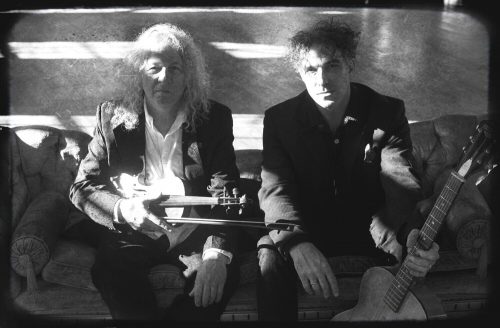By Michael Lello
Photo by Jonno Rattman
In 2007, when Lewis & Clarke released its most recent full-length album “Blasts of Holy Birth,” Apple was launching its first iPhone. The Hollywood Writers Guild went on strike, and a mass shooting spree darkened the campus of Virginia Tech. Anna Nicole Smith died, and Vladimir Putin was named Time’s Person of the Year.
Much water has flowed under many bridges since Lou Rogai’s collective put out “Blasts,” so much so that we’ve joked that a new album, if it ever came out, should be called “Delaware Water Gap Democracy,” a reference to the Eastern Pennsylvania town Rogai calls home and the Guns N’ Roses album that took 15 years to see the light of day. (“Triumvirate didn’t take 15 years, though; the band released an EP, “Light Time,” in 2009 and toured, and listeners subsequently anticipated a new full-length).
It’s all a wordy way of saying “Triumvirate,” L&C’s new studio album out Oct. 7, was a long time coming. Indeed, in 11 years since Rogai and his sometimes rotating cast of players began recording under the L&C banner, there have been only six total releases to speak of, and including “Triumvirate,” three full-lengths.
When we catch up with Rogai by phone, one of the first things we ask is this: How did you know when “Triumvirate” was finished?
“When I had enough money to pay for mastering for a double album on vinyl I knew it was ready,” he says, laughing.
But seriously, folks: “It was all kind of an experiment,” adds Rogai. “I wasn’t in a rush. I didn’t have a deadline. If something didn’t feel right, I’d wait until it felt right. That said, the next album I do will be on a strict deadline.”
Later, he follows up, adding: “Knowing the record was finished was like following a baking recipe, except the recipe had yet to be written. It had to write itself and had to be experimented with it until it came out right. That’s how I knew it was finished, otherwise I could have experimented forever.”
To our ears, the album seems to have a more direct approach in its content, with Rogai’s proclamations on life and renewal laid more barely than in his recent music. (We’ll share more of our impressions of “Triumvirate” in an upcoming album review.)
“I don’t know if it would be a matter of direction or indirection, but I think I had a more pointed vision,” surmises Rogai. “And I’m not trying to purposefully create metaphors to confuse people or duck issues, but to me it’s just more satisfying to paint with imagery than to tell a story literally.
“It’s not like I’m giving someone directions down the street when it’s imperative that someone arrives there immediately.”
The Lewis & Clarke lineup as it exists today began to coalesce around the recording and concurrent live shows associated with “Light Time,” the EP released in 2009. Chief among the band roster are brothers Ian O’Hara (formerly on upright bass, now on keyboards) and Shane O’Hara (percussion). Anthony Lavdanski, on upright bass, is the most recent appointee.
“I think solid is a really good way to describe the lineup we have right now,” Rogai says. “There’s been a couple of floating string players, and that’s easily interchangeable because of the chord structures of Ian on keys, whereas on ‘Light Time’ he played bass and for those live shows he played bass. Anthony Lavdanski is an extremely talented double bass player. And of course Shane and Ian are rock-solid dudes, and they’re very logical players, and I feel that’s where their artistry comes in – their logic. They’re almost like mathematicians.”
The early sessions for what would become “Triumvirate” were scrapped by Rogai. The band then revisited and reworked the material into what is heard on the final presentation.
“In the past I was trying to combine elements in the lineup that were not necessarily compatible, and what I found in the early stages of the recording of ‘Triumvirate’ was that there were elements that were almost contradictory,” he says. “So luckily Shane and Ian in particular were extremely patient and we scrapped the first demo and the first early tracking of the record totally to revisit it with a proper lineup and really get the right vibe.
“Now if I was under the pressure of a deadline, to make that happen I would have had to put out a record that wasn’t captured properly.”
Similarly to Rogai’s note that he wasn’t aware of “Triumvirate’s” blueprint until it presented itself during the creative process, the album also turns out to be the final piece in an L&C triptych along with “Blasts of Holy Birth” and “Light Time.”
“It’s not a concept in the way that a prog rock ’70s album would be a concept album, but it is a concept of this triad of records that were meant to be together,” says Rogai. “I didn’t realize it was the third and final installment until the recording was totally finished. I didn’t intend for it to be a concept spread out over three records, but because of the content of the records and the style of the lyrics and reflection of where I’m moving through, it made sense.”
As part of the album-release cycle, Lewis & Clarke have a string of live shows booked, including a recent performance at Boot & Saddle in Philadelphia, a Saturday, Oct. 4 date at the Antoine Dutot Museum in Delaware Water Gap and an Oct. 20 engagement at Glasslands in Brooklyn.
Rogai explains the on-stage experience as “a moment when people perform, they leave their consciousness.”
“And to do that in public is a really interesting feeling. I don’t know if it’s a good feeling or sometimes people are nervous and it can bring an interesting energy,” he says. “When I play the music live, I hope to connect. That’s what anyone would want to do. It’s a different kind of feeling between recording or playing live.”
Rogai recently reconnected with former protégé Tim Showalter, who records as Strand of Oaks. Strand of Oaks’ debut record “Leave Ruin” was released on La Soc. The act has since signed to Dead Oceans and received strong press coverage for its most recent records. Showalter guested on L&C’s “Shaking Through” session, which should be released in October.
The mentor and protégé dynamic between Rogai and Showalter has shifted since Showalter left La Soc, but the two, who shared a bill at Mercury Lounge in June, do have a relationship again.
“It’s really good,” says Rogai. “We bounce ideas around and catch up with one another, and I feel like we’re colleagues, where before he felt like my little brother who I was giving noogies to.”
Worth noting, too, is La Soc’s new relationship with the Manimal Group, which will distribute “Triumvirate.” Rogai has previously contributed songs to David Bowie and The Cure tributes released on Manimal Vinyl.
Rogai speaks highly of Manimal founder Paul Beahan, who recently started Manimal Group, the distribution wing and “invited me to be a part of it.”
It’s another methodical, relatively non-descript move by Rogai, who has a knack for making a subtle yet profound statement.
“When I played music years ago that was loud and distorted at a high volume, it was easier to become lost in that aspect of the music. But when you’re playing music that’s quieter or more fragile, there’s a vulnerability in that mistakes are easily seen in the empty spaces.
“You feel more on the edge in the quiet spaces available.”




Leave a Reply